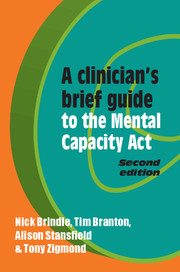Book contents
- Frontmatter
- Contents
- Preface
- Preface to the second edition
- Common abbreviations and terms
- 1 The legal framework: the Mental Capacity Act, the Human Rights Act and common law
- 2 The Mental Capacity Act and the authority to treat
- 3 Assessment of capacity
- 4 Best interests
- 5 Alternative authority – planning for the future
- 6 Independent Mental Capacity Advocates and regulation of research
- 7 Deprivation of Liberty Safeguards
- 8 The Court of Protection, clinically relevant judgments from the courts and writing reports
- 9 The Mental Health Act
- References
- Index
6 - Independent Mental Capacity Advocates and regulation of research
Published online by Cambridge University Press: 01 January 2018
- Frontmatter
- Contents
- Preface
- Preface to the second edition
- Common abbreviations and terms
- 1 The legal framework: the Mental Capacity Act, the Human Rights Act and common law
- 2 The Mental Capacity Act and the authority to treat
- 3 Assessment of capacity
- 4 Best interests
- 5 Alternative authority – planning for the future
- 6 Independent Mental Capacity Advocates and regulation of research
- 7 Deprivation of Liberty Safeguards
- 8 The Court of Protection, clinically relevant judgments from the courts and writing reports
- 9 The Mental Health Act
- References
- Index
Summary
The Independent Mental Capacity Advocate (IMCA) service helps support people who are incapacitous and have no friends or family to make important decisions for them. In relation to some decisions, such as those about serious medical treatment or moving accommodation (defined on p. 65 and p. 66 respectively), there is a legal requirement on NHS bodies and local authorities to appoint an Independent Mental Capacity Advocate to represent an individual unable to make their own decision if there is no one else to support them (statutory advocacy under the Mental Capacity Act).
These powers have been extended by regulations authorising the NHS or local authority to instruct Independent Mental Capacity Advocates in certain cases involving care reviews and adult protection procedures (‘safeguarding adults procedures’).
Put more formally, Independent Mental Capacity Advocates help safeguard the rights of people who are unable to make a decision about a long-term move or serious medical matter and have no one, except paid staff, willing or able to help them. The decision maker must take an advocate's opinion into account.
Local authorities commission Independent Mental Capacity Advocacy services, and responsible bodies (the NHS and local authorities) have a duty to make sure that there are sufficient advocates to be called on when needed. However, all advocates are trained and provided by independent organisations.
The advocate service is provided for any person aged 16 years or older. Referral arrangements vary locally, but referrals can be made by telephone or email. At the time of the referral:
‣ the person referred must lack the capacity to make a particular decision
‣ the decision must be concerned with serious medical treatment, a change in accommodation, a care review or adult protection procedures, and
‣ there must be nobody who can appropriately support and represent the person (this does not apply to adult protection procedures).
In adult protection cases, a person with no one else to support them is entitled to an Independent Mental Capacity Advocate if the decision maker is satisfied that the person will benefit.
- Type
- Chapter
- Information
- A Clinician's Brief Guide to the Mental Capacity Act , pp. 64 - 71Publisher: Royal College of PsychiatristsPrint publication year: 2015

